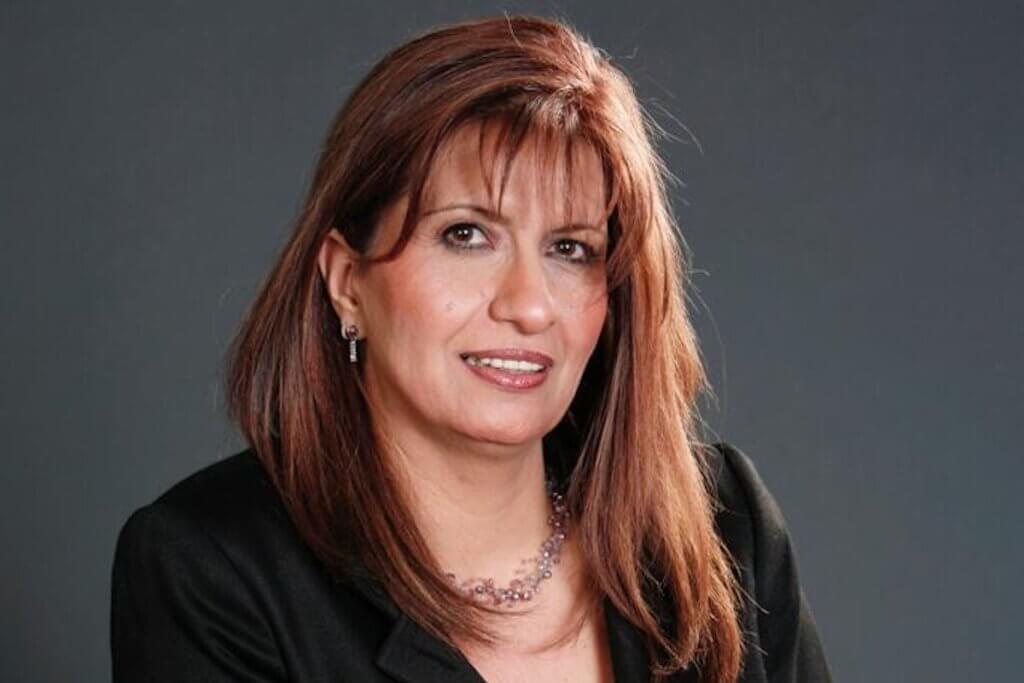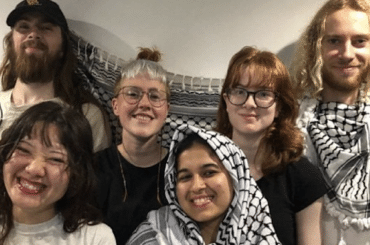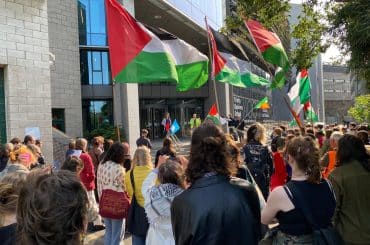On April 18 2024, Professor Nadera Shalhoub-Kevorkian was detained by police in Jerusalem for comments she made about the genocide in Gaza during a podcast a month prior. Professor Shalhoub-Kevorkian was shackled, held overnight in a cockroach-infested jail cell, denied medication, strip searched, and treated in a humiliating and violent manner. Multiple interrogations by the police ensued over weeks. Scholars around the world immediately expressed grave warnings about Hebrew University’s shocking assault on academic freedom, and deliberate criminalization of dissenting speech. In the months since she was arrested, Professor Shalhoub-Kevorkian has been senselessly questioned by police about academic concepts that have appeared in her peer reviewed research and publications including but not limited to, settler colonialism, judaization of Jerusalem, the occupation of Jerusalem, unchilding, and swarming. In addition to the minister of interior affairs, Ben-Gvir, celebrating her arrest in April 2024, Knesset members are currently pushing for a law to deprive her of her earned pension, savings, and salary. Hence, the campaign against Professor Shalhoub-Kevorkian not only continues to this day, but has morphed and reached the highest levels of the state.
The Open Letter below calls for an immediate halt to all attacks and campaigns against Professor Shalkhoub-Kevorkian. Authored by a collective of feminist scholars in May, the letter has since been signed by numerous academic departments and professional organizations to call attention to the belligerent and deeply racist and sexist state campaign against Professor Shalhoub-Kevorkian, which continues in alarming new forms.
The state-sponsored attacks against Prof. Shalhoub-Kevorkian exemplify what the BDS movement has long argued: that Israeli universities function as agents of the state, enacting Zionism’s project of apartheid rule, dispossession, and Palestinian erasure. We cannot understate the urgency of this moment: let this context of dire repression reinvigorate the abolitionist praxis of the Boycott, Divestment, Sanctions movement as the largest global Palestinian solidarity movement.
-Stéphanie Wahab and Amira Jarmakani
Feminist Scholars Stand with Professor Nadera Shalhoub-Kevorkian
Who We Are
We are a broad coalition of international feminist scholars engaged with issues related to gender, violence, and trauma. We represent numerous disciplines, languages, and universities, and we join together in calling for the State of Israel to immediately investigate the circumstances that led to opening an investigation into renowned Hebrew University feminist legal and social work scholar, Dr. Nadera Shalhoub-Kevorkian.
We uphold a feminist praxis for true academic freedom and begin with the premise that all forms of genocide, including sophicide and scholasticide are antithetical to learning, teaching, well-being, and safety; that university administrators and authorities everywhere should be held accountable for their role in genocide and systemic oppression; and that feminism must expose the matrix of power, its operation, performativity, and functionality; and must center the ability to live and learn freely, from our campuses all over the world to Palestine. Anchored in a feminist praxis for academic freedom and freedom of speech amidst a genocide, we demand the immediate cessation of the reprehensible persecution and investigations against Professor Nadera Shalhoub-Kevorkian. This investigation is just the latest installment of intimidation, harassment, and public smear tactics employed by the state against Professor Shalhoub-Kevorkian to silence her academic work.
Professor Shalhoub-Kevorkian’s Feminist Research and Scholarship
Professor Shalhoub-Kevorkian is a trained clinical social worker, and internationally renowned scholar whose research has engaged and impacted disciplines including Social Work, Anthropology, Psychology, Feminist Studies, Settler Colonial Studies, Indigenous Studies, Critical Criminology and Studies of State Crimes, Liberation Psychology, and Gender Studies. She has written ten books and edited volumes and countless articles published in the most prestigious and rigorous academic journals, reflecting the depth and breadth of her intellectual scholarship, and fields of impact. She is a public intellectual and expert on topics as diverse as critical childhood studies, incarceration, gender-based violence, militarization and its impacts on women, nationalism, and surveillance technologies. She has been recognized through many research grants, awards, and fellowships for her cutting-edge work, including the Impact Award Winner at the 7th Annual International Conference on Genocide in 2020 for her path-breaking research on military occupation and state violence, conducted through a feminist criminological approach.
Her three decades of groundbreaking research has had an immense influence on how scholars around the world understand violence and trauma. Her work sheds light on the critical elements of abuses of power (both hidden and apparent), experiences, and residues of ongoing and cumulative trauma that children and families face intergenerationally under conditions of long-lasting systemic oppression and dispossession. She has made extensive contributions to our understanding of women, children, and families living under military rule, notably in her most recent book, Incarcerated Childhood and the Politics of Unchilding.
At the Hebrew University, Professor Shalhoub-Kevorkian has mentored countless Palestinian and Jewish-Israeli faculty and students, serving as supervisor for numerous graduate students. Professor Shalhoub-Kevorkian’s work has been instrumental to our feminist envisioning. Her work has been an inspiration as it has provided us with a framework for “teaching life” in the context of the ongoing catastrophe in Gaza, what she terms “overkillability” as genocide. Professor Shalhoub-Kevorkian teaches her students and emerging social workers, future psychologists, feminists, and legal scholars at Hebrew University and beyond, how to contribute to the transformation of trauma and collective grief by ways of informed intersections of knowledge and love for children and family life, for collectivity, connectivity, and livability – cutting across boundaries and groups – inspiring her students and colleagues to dare to know deeply and differently all those impacted by violence, always approaching devastating loss with love, collective care, and devotion to humanity. As such, we deplore the public shaming, physical endangerment, and criminalization of Professor Shalhoub-Kevorkian, along with the discreditation and erasure of her research. Her work provides us with a framework for social responsibility amidst a genocide, freedom, and love at a time when it is needed most. An attack on Professor Shalhoub-Kevorkian is an attack on all of us, and we will not stand idly by.
The recent attacks on Professor Nadera Shalhoub-Kevorkian have attempted to criminalize her not only for her critique of Israeli genocide, but also for her identity as a Palestinian, and her leadership among a community of Palestinian scholars that resist settler-colonial reality bending. Research is always political as it becomes a space of holding onto memory, continuing the Palestinian story, and affirming Palestinian life and futurity, defying the logics of erasure upon which the settler state relies. Professor Shalhoub-Kevorkian is a living archive who evades settler-colonial domination and control. In this way, the targeting and arrest of Professor Shalhoub-Kevorkian from her home in the Old City of Jerusalem while in her bed, to silence her and incarcerate her body, are clear and obvious strategies to deter others, to delegitimize Palestinian scholarship and existence and to attack our living archive, our collective memory, our embodied homeland.
Ethnographic feminist research methods that define the life work of Professor Shalhoub-Kevorkian intuit the mundane and everyday violence, and often intentionally obscured to confuse and alienate research produced by oppressed communities. The research methods that Professor Shalhoub-Kevorkian uses are themselves modes of anti-colonial resistance that have a long tradition in Indigenous studies, critical race theory, and Palestinian feminist studies. As an anti-colonial feminist scholar, who is a deeply valued member of our global community, Professor Shalhoub-Kevorkian builds her analysis from the ground up with communities who are surviving and persisting against everyday violence. In so doing, her research is an act of community-building by elevating the voices of those most marginalized, invisibilized, criminalized, and silenced. In her research and scholarship, Professor Shalhoub-Kevorkian refuses to be entrapped by methods and analyses that uphold colonial narratives disguised as decontextualized ‘truth.’ Instead, she anchors her work by listening rigorously and relationally to children and families most impacted by the very social problems she is committed to addressing. In this time of genocide, her commitment to turn toward the children and families most impacted by state-sponsered violence, to center ashla’a, or dismembered body parts and insisting on Palestinian wholeness and re-membering the dismembered, is an act of livability, hope, love, and strength, requiring incredible courage and care. Ironically, instead of being valued and celebrated for her acts of resilience, intellectual courage, and love for humanity, she is being punished and silenced.
Attacks on Prof. Shalhoub-Kevorkian Are Part of the Genocide
As we condemn the ongoing attacks on Professor Shalkhoub-Kevorkian, we are acutely aware of the ongoing genocidal assault on our siblings in Gaza. The state wants our collective mobilization and love to be dismembered, to distract us from the ongoing atrocities in Gaza by focusing on individual Palestinians, like Professor Nadera Shalhoub-Kevorkian. But even as her research is targeted, the attacks on Professor Shalhoub-Kevorkian sprout from her unapologetic centering of Gaza, the genocide, the erasure, and the gendered state violence propelling further settler colonial violence forward. The targeted attacks on her as a scholar are part of the deliberate annihilation of Palestinian knowledge traditions inspired by the land itself as well as the carriers of that knowledge, which stretch across the fragmented geographies of the Palestinian cultural body, or sophicide. Sophicide also includes scholasticide, a Palestinian concept that refers to the physical destruction of centers of knowledge, educational resources, infrastructures, and archives as well as the silencing, censorship, and repression of Palestinian history, epistemology, scholarship, and subjectivity.
Evidence of the intentional obliteration of Palestinian knowledge and knowledge production rests in the zionist IOF’s complete destruction of all 12 universities in Gaza, in addition to the destruction of over 378 schools, public libraries, laboratories, classrooms, and research facilities, depriving Palestinians of the histories and knowledges housed in these institutions. Understanding this form of genocide as sophicide elucidates how schools, universities, and learning spaces are not just physical structures; they are “the fabric of life.” These were places of realizing the aspirations of Palestinian youth who had been under siege in Gaza their entire lives.
Even while holding Israeli and U.S. citizenships, internationally renowned as a feminist scholar and activist for women and children’s rights, she is not immune to settler-colonial violence and oppression. The attacks on Professor Shalhoub-Kevorkian and her research are deeply intertwined with the attacks on Palestinian educational institutions, scholars and students across the geographies of Palestine that settler colonialism attempts to fragment and dismember. This dismemberment manifests in the violence of checkpoints, walls and boundaries that separate Palestinian populations across 1948 (the Israeli state), the occupied West Bank (including East Jerusalem), the Gaza strip, and the shatat (diaspora), materialized and embodied in differentiated ID regimes, designations between civil and military courts and dispossession from land resources (water, agricultural, shepherding). Israel is clear in its action: fragmentation is a tool of coloniality, and the violence used against the Indigenous is unified through the intention of erasure and dismemberment.
Our Love and Collectivity Won’t be Uprooted or Dismembered
Professor Nadera Shalhoub-Kevorkian stands as a weaver of re-membering Palestine. We must identify the context of this attack on Professor Shalhoub-Kevorkian, and not re-enact settler colonial dispossession, fragmentation and maligning. The arrest and ongoing threats to silence Professor Shalhoub-Kevorkian in this time of a genocide in Gaza is one further dimension of colonial efforts to dis-member the togetherness of the Palestinian collective knowledge production against epistemic violence, and to block our ability to accompany one another, seeking to further condemn us to a forever state of separation. Seeking to incarcerate Professor Shalhoub-Kevorkian and to delegitimize her scholarship is an attempt to further silence and separate our Indigenous sources of love and knowledge rooted in our lands, intimacies, togetherness, and histories. However, our love and collectivity as a people cannot be uprooted or dismembered. Palestine, from the Jordan River to the Mediterranean Sea, is a unified call for liberation, love, and re-memberance.
Consequently, we stand in unison to call on the state and police to immediately drop their abusive investigation and case against Prof. Shalhoub-Kevorkian. In addition to an apology for the false allegations, arrest and investigation, we demand – both from the police and university – that her physical health and freedom of movement be protected and cared for as a result of the traumatic events. We also demand that she be given time to recover, and that her academic freedom, free speech, and rights be protected so she may continue her inquiry and scholarship focused on the impacts of state-sponsored ongoing trauma on children, women, families and community.
We stand in solidarity to honor Prof. Shalhoub-Kevorkian, a crucial body of scholarly work, and commend her research, methodologies, and theorization as rigorous and admirable.
Feminists, Act Now!
We demand the following:
- AN URGENT INVESTIGATION INTO CIRCUMSTANCES THAT LED TO THE DECISION TO OPEN AN INVESTIGATION AND INTERFERENCE FROM THE MINISTER OF NATIONAL SECURITY;
- DROP THE CASE AGAINST NADERA NOW! Sign the petition to demand the case be dropped now;
- CLOSE THE CRIMINAL INVESTIGATION; and
- ISSUE A PUBLIC APOLOGY FOR DEFAMING PROFESSOR SHALHOUB-KEVORKIAN
Signed,
Academic departments and professional organizations:
- Association of Middle East Women’s Studies
- The Department of Feminist Studies, University of California, Santa Cruz
- California Scholars for Academic Freedom
- UBC Graduate Students for Palestine
- Indiana Center for Middle East Peace
- Anthropology, University of California, Davis
- Semel Institute for Neuroscience and Human Behavior, University of California at Los Angeles
- Women’s, Gender, and Sexuality Studies Program, Winona State University
- Justice Studies, San Jose State University
- Chicana/o Studies; California State University at Northridge
- Sociology, California State University, Long Beach
- Liberation U
- Department of Anthropology, Rice University
- Women’s Studies, San Diego State University
- The Gallatin Human Rights Initiative, NYU
- Institute for the Study of Gender and Sexuality, Columbia University
- Women’s, Gender, and Sexuality Studies, Portland State University
- Department of Gender & Sexuality Studies, University of California, Riverside
- UMN Educators for Justice in Palestine
- English Department, California State Polytechnic University Humboldt
- Students for Justice in Palestine Atlanta University Center Consortium
- Department of Women’s & Gender Studies, Syracuse University
- Portland State University, Women, Gender, & Sexuality Studies Department
- Feminist Student Association, California State University Northridge (CSUN)
- Arab American Cultural Center at University of Illinois at Chicago
- Women’s and Gender Studies, Trinity University
- Faculty and Staff for Justice in Palestine, CSUN
- Department of Gender, Women and Sexuality Studies, University of Washington
- Department of Critical Race and Ethnic Studies, University of California at Santa Cruz
- UCD Centre for Gender, Feminism & Sexualities, University College Dublin
- Department of Critical Race, Gender & Sexuality Studies, Humboldt State University
- Arab and Muslim Ethnicities and Diasporas Studies, San Francisco State University
- Program in Women’s, Gender, and Sexuality Studies, Washington State University Vancouver
- Women’s, Gender and Sexuality Studies, Barnard College, Columbia University
- Department of English, University of California at Davis
- Gender, Women’s & Sexuality Studies program, Eastern Washington University
- Department of Feminist, Gender, and Sexuality Studies, Scripps College
- Department of gender, sexuality and women’s studies, University of California at Davis
- Program in Women’s, Gender, and Sexuality Studies, Washington State University
- Department of American Cultural Studies, Western Washington University
- Palestine, Arab, and Muslim (PAM) Caucus of the California Faculty Association (CFA)
- Queer Studies, California State University, Northridge
- Gender and Women’s Studies, Pomona College
Organizations
- The Palestinian Feminist Collective
- 18 Million Rising
- MPower Change
- Black Lives Matter Grassroot
- Project Hajra
- HEART Women and Girls
- Red Canary Song
- Pou Mahi a Iwi Cultural Work Centre, Aotearoa.New Zealand
- CODEPINK
- Feminist Foreign Policy Project
- Teaching Palestine: Pedagogical Praxis and the Indivisibility of Justice
- INCITE! Palestine Force
- US Campaign for Palestinian Rights (USCPR)
- Love and Protect
- JVP Northern NJ
- JVP Sacramento
- Global Peace Alliance BC Society
- ASATA-Alliance of South Asians Taking Action
- Palestine Writes Literature Festival


